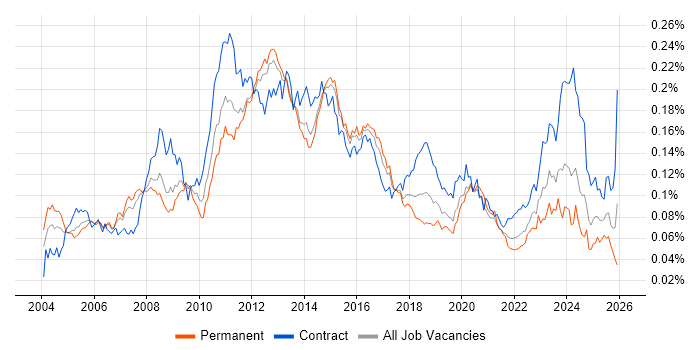Storage Engineer
UK > England
The median Storage Engineer salary in England is £45,000 per year, according to job vacancies posted during the 6 months leading to 19 May 2025.
The table below provides salary benchmarking and summary statistics, comparing them to the same period in the previous two years.
| 6 months to 19 May 2025 |
Same period 2024 | Same period 2023 | |
|---|---|---|---|
| Rank | 673 | 770 | 860 |
| Rank change year-on-year | +97 | +90 | +250 |
| Permanent jobs requiring a Storage Engineer | 13 | 63 | 62 |
| As % of all permanent jobs advertised in England | 0.026% | 0.073% | 0.070% |
| As % of the Job Titles category | 0.029% | 0.077% | 0.077% |
| Number of salaries quoted | 10 | 52 | 50 |
| 10th Percentile | - | £32,500 | £46,125 |
| 25th Percentile | £31,250 | £41,250 | £52,813 |
| Median annual salary (50th Percentile) | £45,000 | £50,500 | £61,000 |
| Median % change year-on-year | -10.89% | -17.21% | +10.91% |
| 75th Percentile | £65,313 | £55,000 | £75,000 |
| 90th Percentile | £74,750 | £69,750 | £87,750 |
| UK median annual salary | £45,000 | £50,000 | £61,000 |
| % change year-on-year | -10.00% | -18.03% | +10.91% |
All Permanent IT Job Vacancies
England
For comparison with the information above, the following table provides summary statistics for all permanent IT job vacancies in England. Most job vacancies include a discernible job title that can be normalized. As such, the figures in the second row provide an indication of the number of permanent jobs in our overall sample.
| Permanent vacancies in England with a recognized job title | 44,992 | 81,767 | 80,747 |
| % of permanent jobs with a recognized job title | 91.03% | 94.55% | 91.53% |
| Number of salaries quoted | 24,381 | 60,882 | 51,425 |
| 10th Percentile | £29,750 | £28,500 | £32,500 |
| 25th Percentile | £41,250 | £38,125 | £45,000 |
| Median annual salary (50th Percentile) | £56,000 | £53,000 | £60,800 |
| Median % change year-on-year | +5.66% | -12.83% | +1.33% |
| 75th Percentile | £75,000 | £71,250 | £82,500 |
| 90th Percentile | £97,500 | £90,000 | £100,000 |
| UK median annual salary | £55,320 | £52,500 | £60,000 |
| % change year-on-year | +5.37% | -12.50% | - |
Storage Engineer
Job Vacancy Trend in England
Job postings that featured Storage Engineer in the job title as a proportion of all IT jobs advertised in England.

Storage Engineer
Salary Trend in England
3-month moving average salary quoted in jobs citing Storage Engineer in England.
Storage Engineer
Salary Histogram in England
Salary distribution for jobs citing Storage Engineer in England over the 6 months to 19 May 2025.
Storage Engineer
Job Locations in England
The table below looks at the demand and provides a guide to the median salaries quoted in IT jobs citing Storage Engineer within the England region over the 6 months to 19 May 2025. The 'Rank Change' column provides an indication of the change in demand within each location based on the same 6 month period last year.
| Location | Rank Change on Same Period Last Year |
Matching Permanent IT Job Ads |
Median Salary Past 6 Months |
Median Salary % Change on Same Period Last Year |
Live Jobs |
|---|---|---|---|---|---|
| Midlands | +66 | 4 | £32,500 | -7.14% | 1 |
| East Midlands | - | 4 | £32,500 | - | |
| London | +102 | 3 | £95,000 | +18.75% | 10 |
| South East | +87 | 2 | £45,000 | -23.73% | 6 |
| North of England | +35 | 2 | £46,500 | +32.86% | 2 |
| Yorkshire | +62 | 1 | - | - | 1 |
| North West | -13 | 1 | £46,500 | +32.86% | 1 |
| Storage Engineer UK |
|||||
Storage Engineer Skill Set
Top 30 Co-occurring Skills and Capabilities in England
For the 6 months to 19 May 2025, Storage Engineer job roles required the following skills and capabilities in order of popularity. The figures indicate the absolute number co-occurrences and as a proportion of all permanent job ads across the England region featuring Storage Engineer in the job title.
|
|
Storage Engineer Skill Set
Co-occurring Skills and Capabilities in England by Category
The follow tables expand on the table above by listing co-occurrences grouped by category. The same employment type, locality and period is covered with up to 20 co-occurrences shown in each of the following categories:
|
|
||||||||||||||||||||||||||||||||||||||||||||||||||||||||||||||||||||||||
|
|
||||||||||||||||||||||||||||||||||||||||||||||||||||||||||||||||||||||||
|
|
||||||||||||||||||||||||||||||||||||||||||||||||||||||||||||||||||||||||
|
|
||||||||||||||||||||||||||||||||||||||||||||||||||||||||||||||||||||||||
|
|
||||||||||||||||||||||||||||||||||||||||||||||||||||||||||||||||||||||||
|
|
||||||||||||||||||||||||||||||||||||||||||||||||||||||||||||||||||||||||
|
|
||||||||||||||||||||||||||||||||||||||||||||||||||||||||||||||||||||||||
